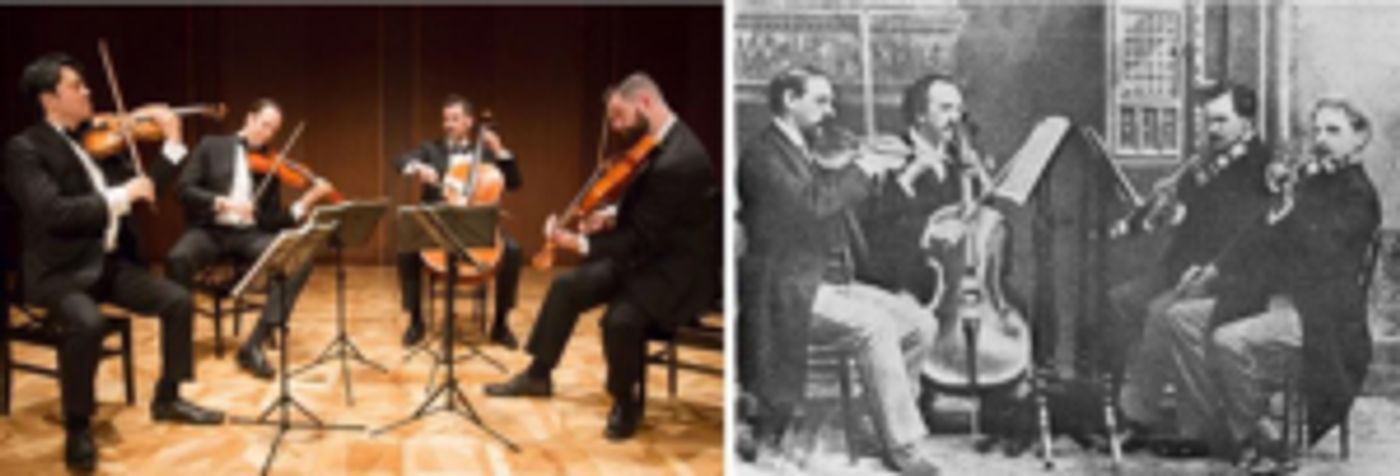Miró Quartet Resurrects Classic 1910 Concert Program In Recital At Carnegie's Weill Hall, October 25

On Friday, October 25, at 7:30 p.m., the Miró Quartet returns to Carnegie's Weill Hall to perform a 1910 recital program by the pioneering Kneisel Quartet (1885-1917), bringing to life a concert experience from a bygone era. The performance is part of the Miró Quartet Archive Project, through which the ensemble recreates three concert programs by three trailblazing American ensembles-each program chosen to capture the special character of the group that played it and the particular flavor of its time. The upcoming program comprises Mozart's String Quartet in B-flat Major, K. 458, "Hunt"; Glière's Andante con Variazione from String Quartet No. 1, Op. 2; Franck's Scherzo in D Major from his String Quartet; Servais's "Fantaisie sur deux Airs russes" for cello and piano, Op. 13, featuring pianist Stephanie Ho; and Schubert's String Quartet in D Minor, D. 810, "Death and the Maiden."
Tickets priced $54 to $65 are available at the Carnegie Hall Box Office, 154 West 57th Street, or can be charged to major credit cards by calling CarnegieCharge at 212-247-7800 or by visiting the Carnegie Hall website, carnegiehall.org.
The Miró Quartet conceived of the Quartet Archive Project as a way of celebrating their own 25th anniversary by honoring the people, pieces, and performances that have shaped the string quartet tradition in America. The project revives classic programs from 1910, 1929, and 1935, which-as violist John Largess explains-are performed "as near as possible to how they were heard then-in the same order, with the same pauses and intermissions. Though some of the repertoire is standard, much is not, and for all three the repertoire and program arrangement is sometimes surprising, and often very different from what today's audiences might expect."
The upcoming program originally dates from January 28, 1910, when it was performed by the Kneisel Quartet at The Schubert Club in St. Paul, MN. The Quartet was founded in 1885 shortly after first violinist Franz Kneisel arrived in Boston to serve as concertmaster of the Boston Symphony Orchestra. He joined together with three fellow BSO strings, and the ensemble went on to become the first professional touring string quartet in America. Friends of Dvořák, the Quartet was a strong proponent of new music and living composers, premiering Dvořák's "American" quartet and his quintet, as well as giving the U.S. premiere of Schoenberg's Verklärte Nacht.
Unlike concerts today, in which multi-movement works are typically performed in full, the Kneisel Quartet often programmed individual movements of new and recent works, and this is reflected in the 1910 program, which features selections from string quartets by their contemporaries César Franck and Reinhold Glière. Also unlike today, the Quartet often devoted a portion of their programs to the cello repertoire, as evident here in Adrien-François Servais's "Fantaisie sur deux Airs Russes" for cello and piano. When touring works that required additional players, the Quartet were joined by local musicians, and in keeping with this spirit, the Miró collaborates with a local pianist wherever they perform this program, in this case with New York-based pianist and educator Stephanie Ho.
The upcoming concert at Weill Hall will be followed by a performance of this program at The Library of Congress on Wednesday, December 18 at 8:00 p.m., as well as in Clemson, SC; Toronto, ON; and Troy, NY. Additional Quartet Archive Project performances are devoted to programs by the Flonzaley Quartet (1929) and Kolisch Quartet (1935).
The Miró Quarteta??violinists Daniel Ching and William Fedkenheuer, violist John Largess, and cellist Joshua Gindelea??is one of America's most celebrated string quartets. The Quartet has performed throughout the world on the most prestigious concert stages, earning accolades from critics and audiences alike. Based in Austin, TX, and thriving on the area's storied music scene, the Miró takes pride in finding new ways to communicate with audiences of all backgrounds while cultivating the longstanding tradition of chamber music.
In addition to celebrating its own 25th anniversary season, the Miró honors the 250th anniversary of Beethoven's birth with the culmination of a 15-year recording cycle of the composer's complete string quartets, to be released as a box set by Pentatone in November 2019. Among the ensemble's other recordings are Schubert Interrupted featuring the composer's "Death and the Maiden" quartet and song with mezzo-soprano Sasha Cooke, and The Miró Quartet Live! with Kevin Puts' Credo, composed for the Miró, and Dvořák's String Quartet in F major. The Miró is also featured in Transcendence, an Emmy Award-winning documentary and multimedia project centered around a performance of Schubert's Quartet in G major on rare Stradivarius instruments.
Formed in 1995, the Miró was awarded first prize at several competitions including the Banff International String Quartet Competition and Naumburg Chamber Music Competition. Committed to music education, members of the Quartet have given master classes at universities and conservatories throughout the world; and since 2003, the Miró has served as quartet-in-residence at the Butler School of Music at University of Texas, Austin. In 2005, the Quartet became the first ensemble ever to be awarded an Avery Fisher Career Grant.
For more information, visit miroquartet.com.

Videos

